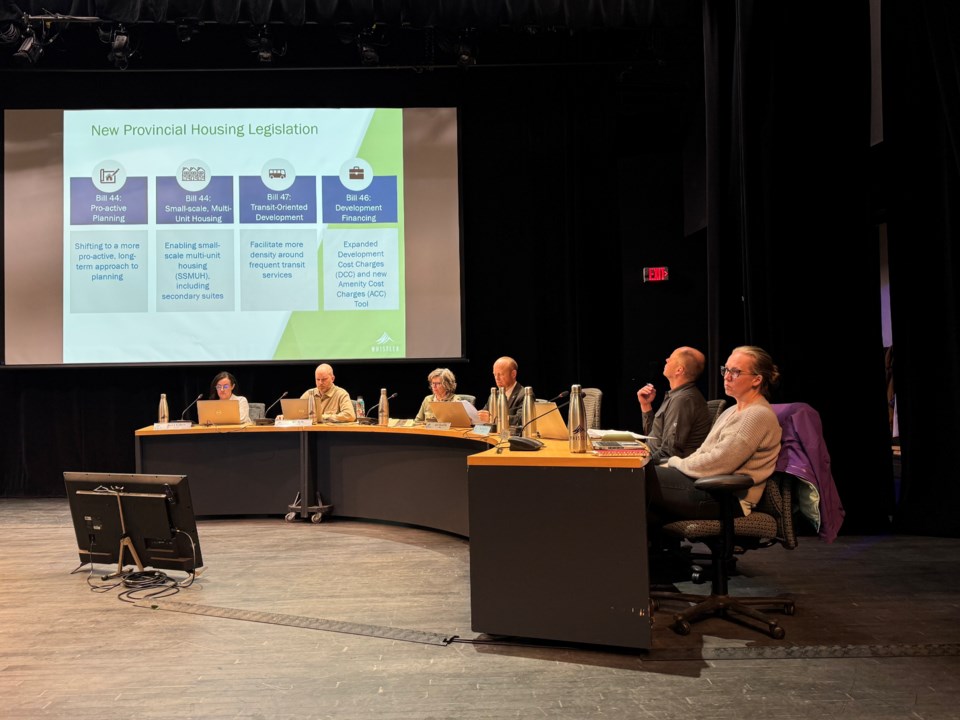The Resort Municipality of Whistler (RMOW) is moving ahead with a focused update to its Official Community Plan (OCP), aiming to comply with new provincial housing legislation while aligning with revised regional planning documents and correcting “housekeeping” issues from the 2020 update.
At its April 8 meeting, council endorsed the project scope and its associated public engagement strategy. The work must be completed by the end of this year to meet provincial deadlines. In late 2023, the Province of British Columbia introduced new legislation to increase housing supply, requiring municipalities to update their zoning bylaws and community plans accordingly.
Whistler has already taken several steps to comply. In June 2024, council adopted a bylaw allowing three to four units on some residential lots to support infill housing. It also designated the Whistler Gondola Exchange as a Transit-Oriented Development (TOD) Area, enabling increased building heights and densities within 200 to 400 metres of the gondola station. In December 2024, the municipality received an Interim Housing Needs Report, which identified a requirement for 1,572 new housing units over the next five years and 5,639 units over the next 20 years.
The next step is to update the OCP to reflect these new policies and to ensure it supports the housing targets, including those for affordable rentals, family housing, seniors’ housing, and homes near transit. The plan must also accommodate the kinds of development enabled by recent zoning changes.
In addition to provincial compliance, the update will amend Whistler’s Regional Context Statement to reflect recent changes to the Squamish-Lillooet Regional District’s Regional Growth Strategy, which was revised in January. That document includes stronger climate action and housing affordability policies that now need to be reflected in Whistler’s own OCP. The municipality will also include minor “housekeeping” amendments, including small text or mapping fixes staff have tracked since the last update in 2020.
The update will take place in four phases over the course of 2025. The first phase, which runs from January through April, focuses on background work and the launch of a dedicated website. The second phase, from April to September, will involve drafting policies and gathering input through online engagement, a community workshop, and outreach to housing and service organizations. From September to October, the third phase will see the plan refined and prepared as a bylaw for council. The final phase, from October to December, will include a public hearing and council’s adoption of the final version.
Community organizations including the Whistler Housing Authority, Zero Ceiling, and Whistler Blackcomb will be invited to participate in workshops. Broader public engagement will occur online and will be promoted during the RMOW’s “Add Your Voice” event in June. Early consultation with the Líl̓’wat and Squamish Nations is also planned, consistent with the RMOW’s framework agreement with the two Nations. School Districts 48 and 93 will also be consulted. The Whistler Centre for Sustainability has been contracted to support communications and engagement under the direction of municipal staff.
Mayor Jack Crompton raised a concern about the necessity of holding a public hearing when the province has already mandated certain zoning changes. “What will happen if the community tells us they do not support the OCP changes as directed?” he asked. In response, planner Joanna Rees said the municipality will have to get specific with its engagement.
“I think when we're going out for engagement, it's going to be central that there's clear communication on which aspects of the amendments are required and which aspects can be tailored to meet the Whistler context,” she said. “So we'll really be looking to be focusing on the engagement on those aspects that can be tailored to Whistler.”
Councillor Arthur De Jong raised concerns about the carrying capacity for what he described as a potential doubling of Whistler’s population. Coun. Jen Ford countered, arguing that Whistler’s property owners aren’t likely to all create fourplexes on their single-family home lots.
A broader, comprehensive review of the OCP, which will examine Whistler’s long-term growth and development, is anticipated within the next three to five years.




